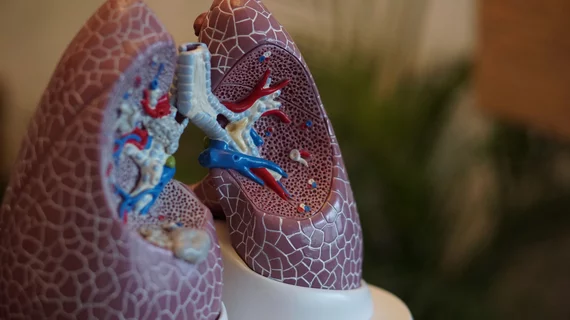Routine chest CT exams contain valuable insights into COPD mortality risks
Routine chest CT scans contain valuable body composition information regarding the overall health of people with chronic obstructive pulmonary disease, including their risk of death, researchers reported Tuesday.
COPD is often associated with obesity and a loss of muscle mass and strength, authors explained April 6 in Radiology. And while CT exams are commonly utilized for heart analyses and to screen for lung cancer, such scans are less often used to pinpoint specific characteristics of COPD.
“Few prior investigators have evaluated muscle quality, bone density, or degeneration of the spine as an index of overall health,” co-author and Radiology Editor David A. Bluemke, MD, PhD, from the University of Wisconsin School of Medicine and Public Health in Madison, said in a statement. “These are readily available and quantifiable in these CT examinations.”
With this in mind, Bluemke et al. used computed tomography scans to assess the association between imaging-based soft tissue markers and all-cause mortality in COPD patients.
In total, they included nearly 3,000 participants enrolled in a large trial studying the roles of soft tissue and bone markers for predicting cardiopulmonary disease outcomes.
The researchers found that a greater amount of intermuscular fat was associated with higher mortality rates. At the same time, more subcutaneous adipose tissue—which accounts for nearly 85% of all body fat—was connected to lower all-cause mortality risks.
Body composition assessments are available in most clinics, the group noted. And in theory, harnessing these insights could help doctors take earlier action for high-risk COPD patients.
Going forward, Bluemke said he believes other groups will begin to take advantage of additional data inherent in medical images.
“I expect that more studies in the future will begin looking at all information on the CT, rather than just one organ at a time,” Bluemke explained. “Clinicians will need thresholds when to intervene when fat or bone abnormalities become severe.”

